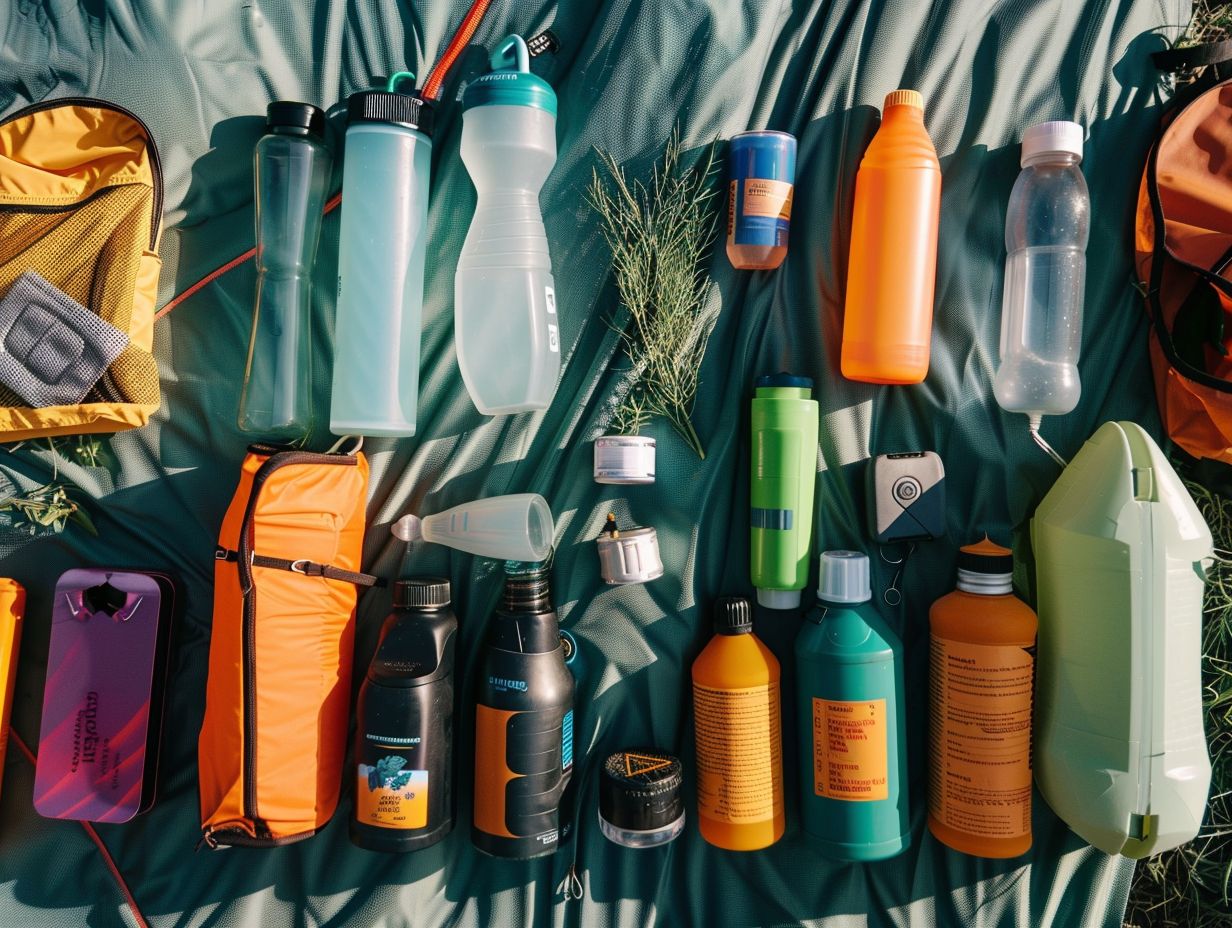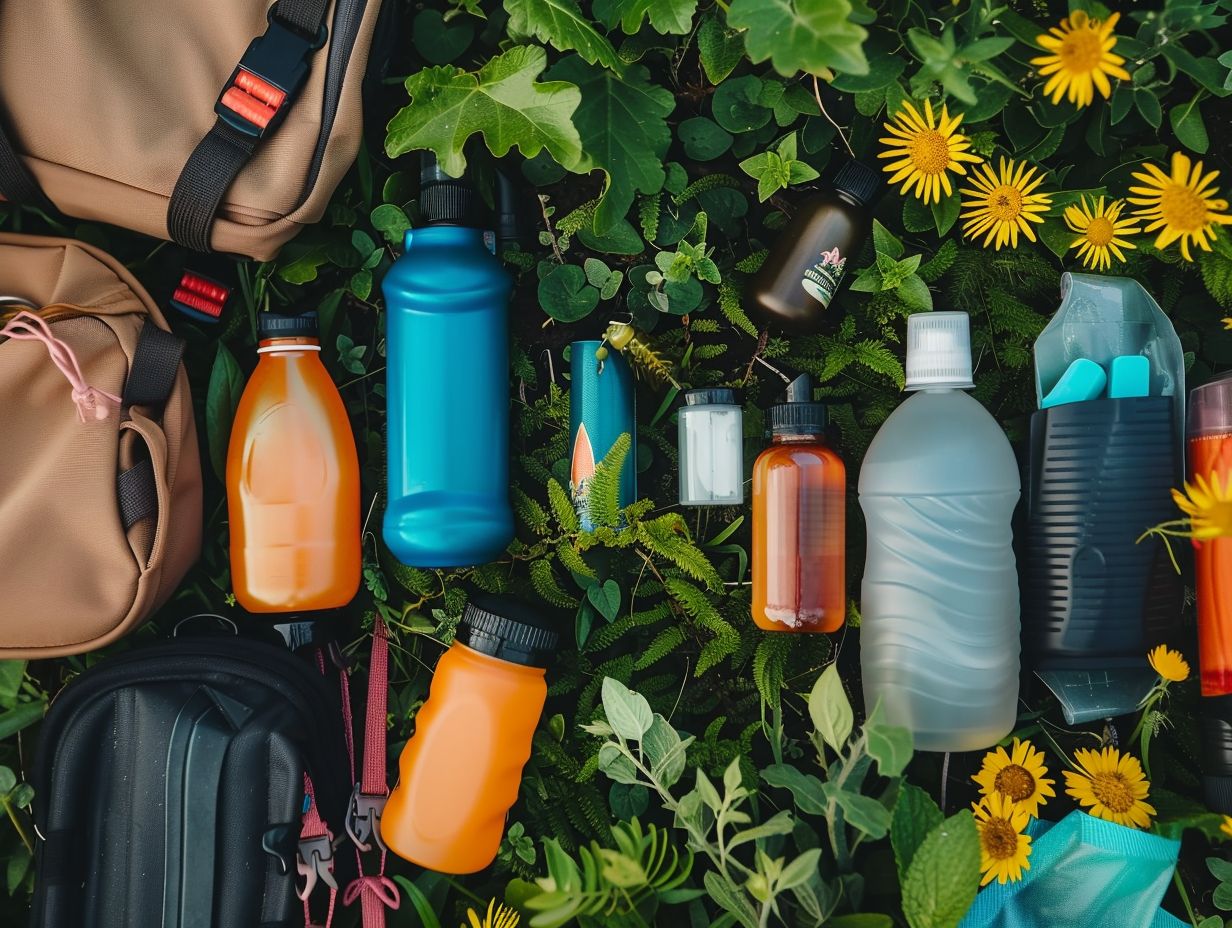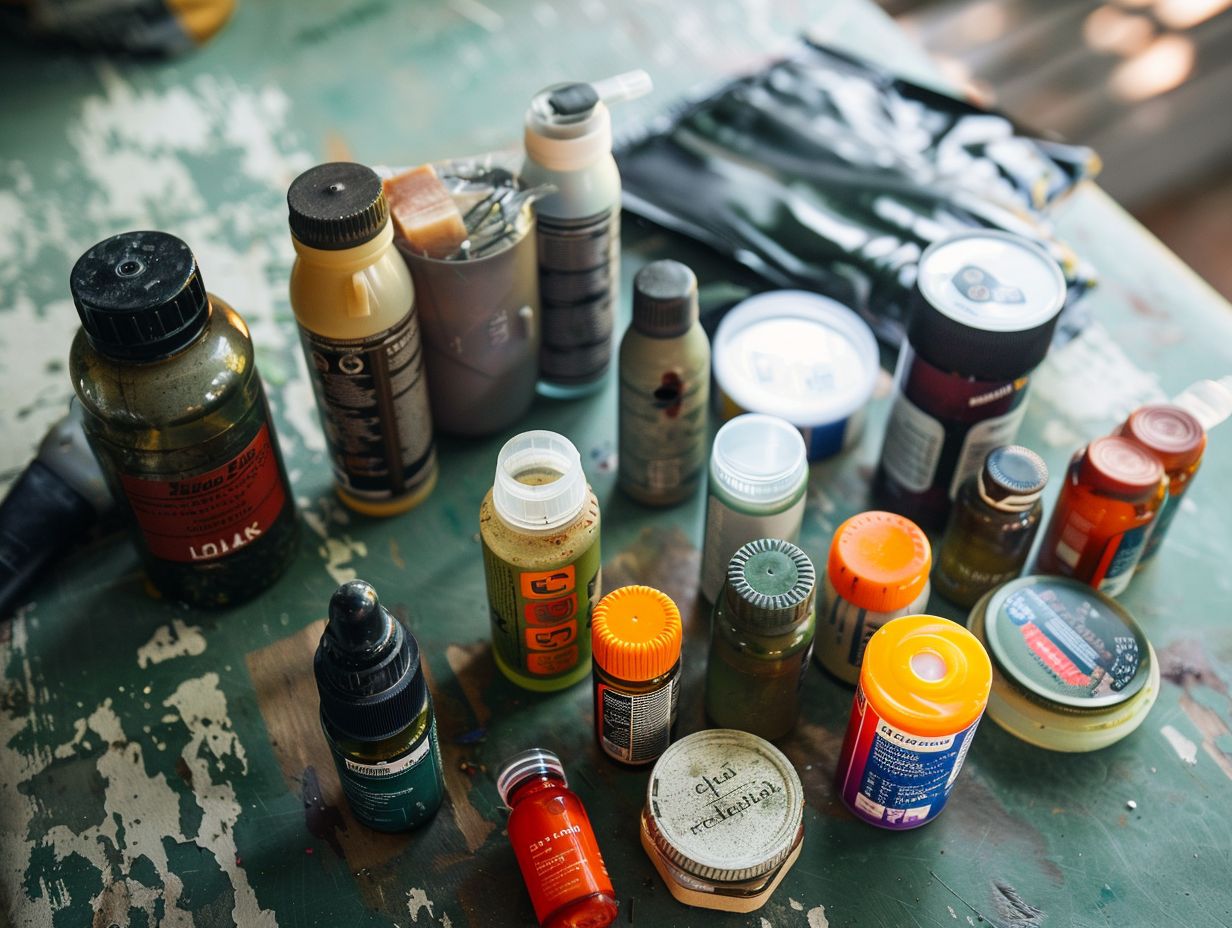Are you searching for effective solutions to tackle those irritating bugs that can disrupt your camping trip? This in-depth guide offers insights into the top insect repellents suitable for campers, including DEET, Picaridin, Oil of Lemon Eucalyptus, IR3535, Permethrin, natural/herbal options, and combination products.
Moreover, we will explore important factors to consider when choosing an insect repellent, correct application methods, safety precautions, and steps to follow in case of a negative reaction.
Ensure your protection and improve your outdoor experience by selecting the best insect repellents that meet your individual needs.
Key Takeaways:

- Choose the right type of insect repellent for your needs, such as DEET, Picaridin, or Oil of Lemon Eucalyptus products, based on the type of insects you will encounter while camping.
- Consider factors like effectiveness, duration of protection, and potential risks when selecting an insect repellent. Combination products may offer more comprehensive protection.
- To properly use insect repellent, follow instructions on the label, apply evenly to exposed skin, and avoid sensitive areas. Take precautions like avoiding contact with eyes and washing off after returning indoors.
1. DEET Products
DEET products are widely recognised for their effectiveness in repelling mosquitoes and other insects, providing a reliable defence for outdoor activities such as camping. The active ingredient DEET is known for its potency against mosquitoes and ticks, making it a popular choice for individuals seeking robust protection.
Studies conducted by organisations like the CDC and WHO have validated the efficacy of DEET-based repellents in various environments, from tropical jungles to urban settings.
DEET products not only offer protection against mosquitoes but also help repel other pests like biting flies, chiggers, and fleas. This broad-spectrum effectiveness makes DEET an essential tool for anyone venturing into areas where insect-borne diseases are prevalent.
2. Picaridin Products
You may find that Picaridin products, such as those offered by Sawyer, serve as a popular alternative to repellents containing DEET. Known for their effectiveness in repelling mosquitoes and other pests, Sawyer’s Picaridin formulations are crafted to deliver long-lasting protection while emitting a pleasant scent.
This quality appeals to those individuals in search of a dependable solution that is also free from strong odours. Users value the non-greasy application of Picaridin repellents, as it ensures a comfortable experience without any sticky residue.
Furthermore, the absence of potent odours in Sawyer’s Picaridin products renders them suitable for outdoor pursuits without the overpowering smell commonly associated with insect repellents.
With EPA approval confirming their efficacy, Sawyer Products have established a strong reputation in the market for supplying safe and reliable mosquito protection tailored for both individuals and families.
3. Oil of Lemon Eucalyptus Products
Oil of Lemon Eucalyptus products offer you a natural and effective alternative for repelling insects like mosquitoes, providing a botanical solution for individuals who are seeking a chemical-free repellent option.
The natural composition of Oil of Lemon Eucalyptus repellents sets them apart from chemical-based alternatives, ensuring a gentle application on your skin without harsh synthetic ingredients.
This aspect not only makes them safer for regular use but also aligns with eco-friendly practices. The Environmental Protection Agency (EPA) approval adds an extra layer of credibility, assuring you of their effectiveness in repelling insects while remaining a sustainable choice for your outdoor activities.
4. IR3535 Products
IR3535 products are renowned for their effectiveness in repelling mosquitoes and other insects, providing a secure and dependable solution for outdoor enthusiasts. The active ingredient IR3535 is acknowledged for its skin-friendly properties, making it a suitable option for individuals seeking a gentle yet efficient repellent.
IR3535 repellents have undergone extensive research and are endorsed by experts for their ability to guard against mosquito-borne illnesses like Zika virus, dengue fever, and malaria. Studies have demonstrated that IR3535 products offer prolonged protection without the adverse effects commonly linked with other insect repellents, establishing them as the preferred choice for families, hikers, and travelers in regions prone to mosquitoes.
5. Permethrin Products

Permethrin products, such as the Sawyer Permethrin range, are designed to protect your clothing and gear from mosquitoes and ticks, providing durable defence for outdoor activities like camping and hiking. The EPA-approved formulation of Permethrin ensures both safety and effectiveness in repelling insects from a variety of fabrics and materials.
When you treat your clothing and gear with Permethrin, you gain additional protection against vector-borne diseases without the need for skin contact with chemical repellents. Sawyer’s established reputation for quality and innovation in insect protection solutions makes their Permethrin products a reliable choice.
The application process is straightforward, requiring users to thoroughly spray or soak their items and allow them to dry before use, creating an invisible barrier against bugs. This simplicity of application and consistent performance make Permethrin-treated products an essential addition to any camping or hiking gear list.
6. Natural/Herbal Products
Natural and herbal insect repellents offer an eco-friendly alternative to chemical-based products, providing effective protection against mosquitoes, ticks, and other pests.
Brands like ThermaCell specialise in developing botanical solutions that are gentle on the skin and the environment, catering to individuals who value natural ingredients in their choice of repellents.
These products incorporate plant-based extracts such as citronella, lemongrass, and eucalyptus oil, which are recognised for their insect-repelling properties. Natural repellents not only shield the skin from irritation and harmful chemicals but also support a sustainable approach to pest control.
ThermaCell’s range of repellents is crafted to offer lasting protection against mosquitoes and ticks, enabling users to engage in outdoor activities without the fear of insect bites. By endorsing these eco-conscious brands, individuals can make a positive environmental impact while safeguarding their well-being.
7. Combination Products
Combining insect repellent products provide a comprehensive defence against a wide array of insects by leveraging the effectiveness of ingredients such as DEET, Picaridin, oil of lemon eucalyptus, and IR3535. These adaptable formulations are ideal for individuals seeking optimal protection against mosquitoes, ticks, and other pests across diverse outdoor environments.
When multiple active ingredients are integrated, these repellents function collaboratively to establish a robust shield against insect bites. The varied composition offers a wider range of protection, effectively targeting different insect species and reducing the risk of resistance development.
Utilising a diverse set of components ensures that the repellent retains its efficacy even in demanding surroundings or when encountering particularly resilient insects.
This multi-faceted tactic not only enhances the repellent’s overall effectiveness but also extends its longevity, delivering lasting coverage throughout prolonged outdoor activities.
Factors to Consider When Choosing an Insect Repellent
When selecting an insect repellent for your outdoor activities, you should consider several factors to ensure optimal protection against mosquitoes, ticks, and other pests. Factors such as effectiveness, safety for skin application, and recommendations from organisations like the CDC and experts in entomology are critical in choosing the most suitable repellent product.
The most important factor to consider when deciding on an insect repellent is its efficacy. It is advisable to look for products that contain active ingredients like DEET, picaridin, or oil of lemon eucalyptus, as these are known for their proven effectiveness in repelling a variety of insects.
Safety is another crucial aspect to consider. It is recommended to choose repellents with skin-friendly formulations to prevent irritation or adverse reactions. Seeking endorsements from reputable sources such as the CDC and respected entomologists can help ensure that the product meets the necessary standards for protection.
By carefully evaluating these factors, you can make informed choices to protect yourself against insect-borne diseases during your outdoor adventures.
How to Properly Apply Insect Repellent
Proper application of insect repellent is essential for effective protection against mosquitoes, ticks, and other insects during your outdoor adventures.
Whether you are applying repellent to your skin, clothing, or gear, it is important to follow correct application techniques and guidelines to maximise the product’s efficacy and provide lasting defence against insect bites.
When applying insect repellent to your skin, ensure that you cover exposed areas evenly, including your arms, legs, and neck. Avoid applying the repellent near your eyes, mouth, or any open wounds, and remember to wash your hands thoroughly after application.
For your clothing and gear, spray the repellent evenly and allow it to dry completely before wearing or using them. Be sure to reapply the repellent as directed on the product label, especially after swimming or excessive sweating. You may also want to consider using permethrin-treated clothing for added protection.
Keep in mind that repellents containing DEET, picaridin, or IR3535 are recommended for optimal effectiveness.
Precautions to Take When Using Insect Repellent

When using insect repellents, it is essential to follow certain precautions to ensure safe and proper usage, especially when applying them to the skin, particularly for children.
According to Joe Conlon from the American Mosquito Control Association, it is recommended to adhere to safety guidelines and refer to resources like the National Pesticide Information Center for best practices.
When applying insect repellents to the skin, it is best to apply them only to exposed areas and avoid contact with the eyes, mouth, and open wounds.
It is important to carefully read the product label for instructions on how frequently to apply and reapply the repellent. When using repellents on children, it is advisable to choose products specifically formulated for their age group, as certain products may not be suitable for young skin. Additionally, experts recommend that parents supervise the application of repellents on children to prevent ingestion or excessive application.
What to Do If You Experience an Adverse Reaction to Insect Repellent
If you experience an adverse reaction to insect repellent, such as skin irritation or discomfort, it is crucial to take swift action to alleviate symptoms and prevent any further complications. Seeking advice from a healthcare professional or reaching out to experts like Sonja Swiger from the Environmental Working Group can offer valuable guidance on effectively managing such reactions.
Immediate steps to address insect repellent reactions may involve cleansing the affected area with mild soap and water, followed by the application of a soothing, anti-itch cream. Should symptoms persist or become more severe, seeking medical guidance is essential to ensure appropriate treatment and care.
The Environmental Working Group provides valuable resources and information on safer alternatives to traditional insect repellents. Remember, prioritising your health and well-being is of utmost importance, so do not hesitate to seek assistance whenever necessary.
How to Store Insect Repellent Safely
Proper storage of insect repellent is crucial to maintain its effectiveness and safety for future use, protecting the product from environmental influences such as extreme temperatures and exposure to sunlight. By adhering to storage guidelines recommended by experts like Chris Fuentes, you can prolong the shelf life of repellents and ensure their efficacy when necessary.
Ensuring that insect repellents are stored in a cool, dry location away from direct sunlight and temperature fluctuations is imperative to preserve their effectiveness. It is recommended to store repellents in their original containers or in securely sealed, opaque bottles to prevent exposure to air and light, as these factors can hasten degradation.
Professionals in the industry, such as Chris Fuentes, stress the importance of verifying the expiration date on repellent products and discarding any expired or damaged containers to uphold effectiveness and safety standards.
Best Insect Repellents for Different Types of Insects
When selecting the best insect repellent for various types of insects, such as mosquitoes, ticks, and other bugs, you need to consider factors like repellency, effectiveness, and product testing results. Reviews and recommendations from users can also offer valuable insights into how well repellents perform against specific insect species.
Some of the leading insect repellents available are specifically designed to target different types of insects. For instance, repellents containing DEET are recognised for their effectiveness against mosquitoes, while those with permethrin are exceptional at repelling ticks. Products like picaridin-based repellents have shown great success in warding off a broad range of bugs.
It’s essential to comprehend the testing methodologies employed by manufacturers to evaluate the product’s reliability. User reviews frequently highlight the efficacy of these repellents in deterring specific insect species, serving as valuable resources for potential purchasers.
Top Brands for Insect Repellents
Regarding insect repellents, you should consider top brands that have established themselves as leaders in providing safe, effective, and environmentally friendly solutions for repelling mosquitoes and ticks. Brands like Ranger Ready and ThermaCell are renowned for their innovative products that offer robust protection without compromising on safety or environmental impact.
Ranger Ready, known for their DEET-free formulas, utilises Picaridin as the active ingredient in their repellents, which is highly effective against a wide range of insects. On the other hand, ThermaCell stands out for its innovative mosquito repellent devices that create a zone of protection without the need for direct application to the skin.
Both brands prioritise quality, safety, and sustainability in their product development, appealing to consumers looking for reliable and eco-conscious insect repellent solutions.
Frequently Asked Questions

What are the best insect repellents for campers?
The best insect repellents for campers include DEET-based products, picaridin-based products, and natural repellents like citronella and lemon eucalyptus oil.
How does DEET-based insect repellent work?
DEET-based insect repellent works by creating a barrier on the skin that insects can’t stand, causing them to stay away from you. It is effective against a wide range of insects, including mosquitoes, ticks, and flies.
Is it safe to use DEET-based repellents?
Yes, DEET-based repellents are considered safe when used according to the instructions on the label. However, it is recommended to avoid using them on children under 2 months old.
What is picaridin and how does it compare to DEET?
Picaridin is a synthetic compound that is similar to a compound found in black pepper plants. It is just as effective as DEET in repelling a variety of insects, but it is less likely to cause skin irritation or damage to plastic or synthetic materials.
Are natural insect repellents effective?
Yes, natural insect repellents can be effective, but they may not last as long as DEET or picaridin-based products. They are a good option for those who prefer to use natural products or have sensitive skin.
How can I make my own insect repellent?
You can make your own insect repellent by combining essential oils like citronella, eucalyptus, and lemongrass with a carrier oil like coconut oil. However, it may not be as effective as commercially available products and should be reapplied frequently.



